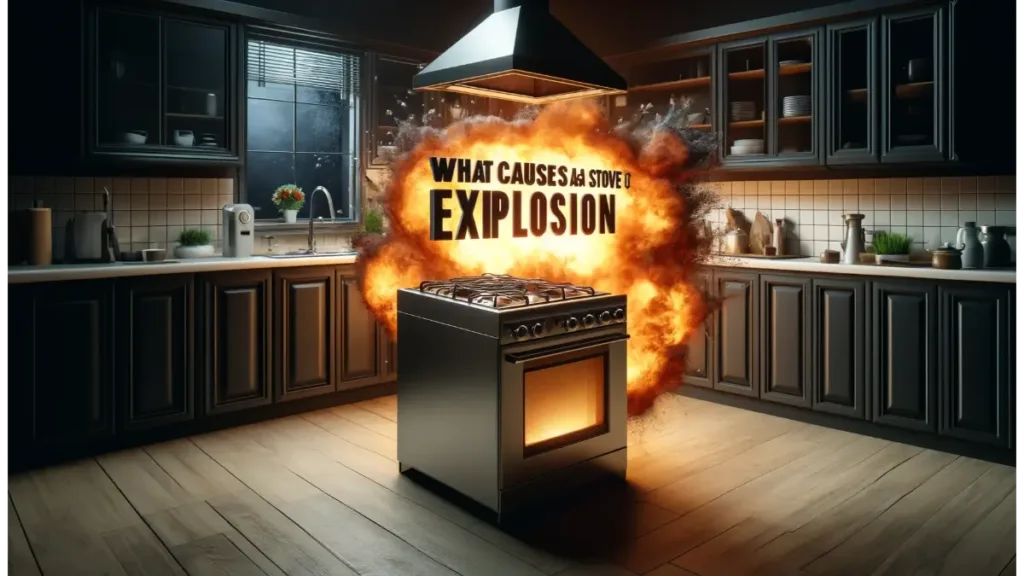According to a new report 120 Americans have died in Gas Stove Explosions in recent years. A Serious Gas Leak Happens Every 40 Hours in the U.S. Gas stoves are the heartbeat of countless kitchens worldwide, renowned for their efficiency and speed in meal preparation. However, it’s crucial to acknowledge the potential risks that come hand-in-hand with this convenience.
While gas stoves are generally safe when used correctly, the consequences of neglecting safety precautions can be severe. It’s crucial to note that approximately 177,000 residential gas leaks were reported in the U.S. in 2020 alone.
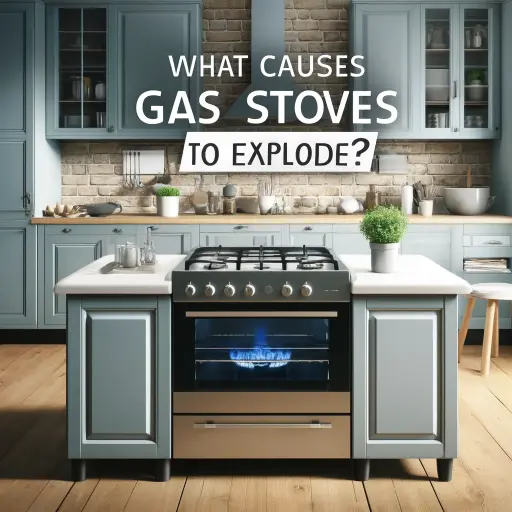
How Gas Stoves Work
A. Basics of Gas Stove Operation
Gas stoves are like cooking wizards. They use a special kind of gas, like propane or natural gas, to create flames that cook our food.
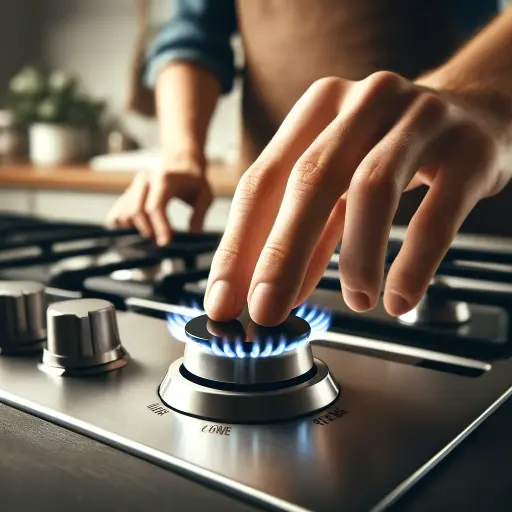
When you turn on a burner, the gas flows out and mixes with air. Then, a spark or a pilot light sets it on fire, creating a controlled flame that you can adjust for heat.
B. Components Involved (Burners, Regulator, Gas Lines)
Let’s meet the backstage crew of your gas stove:
- Burners: These are the star performers. They’re like metal circles or grids on top of your stove. When you turn a knob, gas flows to them, and they light up to cook your food.
- Regulator: This is the traffic cop of the gas flow. It makes sure the right amount of gas goes to the burners. If it’s not working properly, it can cause problems.
- Gas Lines: Think of these as the delivery routes for the gas. They carry it from the gas source to the burners. If there’s a leak or a blockage here, it can be risky.
C. Importance of Proper Installation
Imagine building a puzzle. Each piece needs to fit just right. It’s the same with installing a gas stove. Certified professionals know how to set it up correctly, making sure everything connects snugly. If it’s not done right, it can lead to gas leaks or other safety issues. So, having a pro do the installation is super important for your safety and peace of mind.
11 Common Causes of Gas Stove Explosions
Gas stoves are generally safe, but certain situations can lead to explosions.
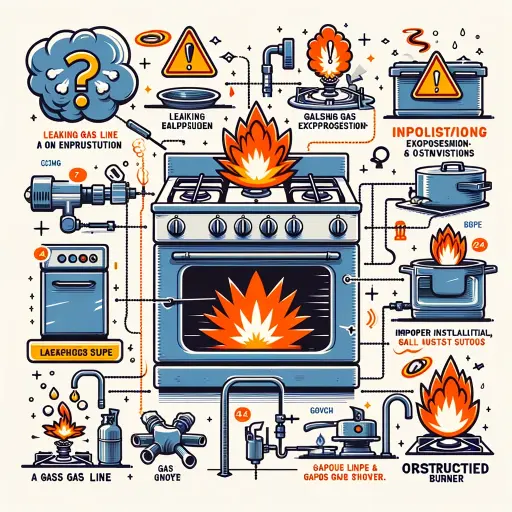
Let’s break down the 11 common reasons:
- Gas Leaks: If there’s a tiny hole or a loose connection in the gas line, it can let out gas, which can lead to an explosion. To identify gas leaks early detection and alarm is vital. Click to Shop on Amazon- Gas Leak Detector and Alarm Device for Stove at home.
- Faulty Connectors: Sometimes, the parts that connect the gas line to the stove may wear out or become damaged, causing leaks.
- Damaged Seals or Valves: These are like little gates that control the flow of gas. If they’re broken or worn out, they might not work properly.
- Pilot Light Problems: The pilot light is like a little flame that stays on all the time. If it goes out, there might be a buildup of gas that can explode.
- Sparks from Electrical Appliances: Sometimes, if a spark from another appliance, like a faulty toaster, gets too close to the stove, it can ignite the gas.
- Open Flames: Having an open flame nearby, like a candle or an unsupervised lighter, can be dangerous around a gas stove.
- Malfunctioning Regulator: The regulator controls how much gas flows to the stove. If it’s not working correctly, it can lead to problems.
- Blocked Ventilation: Proper airflow is important. If the area around the stove is stuffy or poorly ventilated, it can cause a buildup of gas.
- Improper Use: Using the stove in a way it wasn’t designed for, like trying to light it manually when it has an automatic ignition, can lead to trouble.
- Neglecting Maintenance: Like any appliance, gas stoves need regular check-ups. Ignoring maintenance can lead to hidden issues.
- Leaving the Stove On: If you leave a burner on for too long without igniting it, gas can accumulate and become dangerous.
How Often Do Gas Stoves Explode?
A. Statistics on Gas Stove Explosions

Let’s take a closer look at the numbers:
- In the United States, reports indicate that gas stove explosions are relatively rare. For instance, in 2020, there were approximately 30 documented cases of gas stove-related incidents.
- These incidents typically occur due to a combination of factors, including gas leaks, faulty equipment, and human error.
- It’s important to note that while these incidents do occur, they represent a small fraction of the millions of households using gas stoves safely every day.
B. Frequency of Incidents
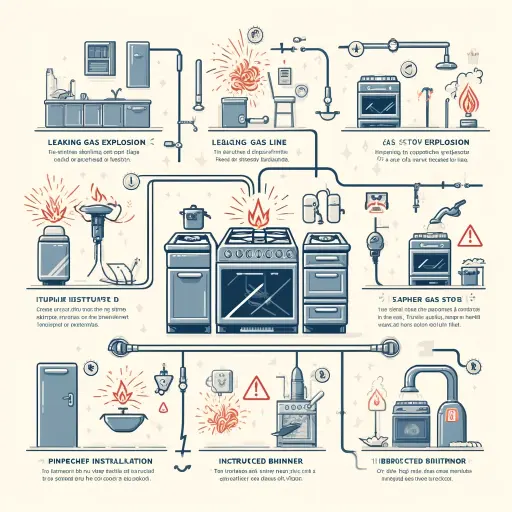
When put into perspective, gas stove explosions are infrequent events. They’re far less common than other household accidents like slips and falls. However, even though they’re rare, they emphasize the need for awareness and safety precautions.
By understanding the potential risks and taking appropriate measures, homeowners can significantly reduce the likelihood of such incidents occurring in their kitchens.
8 Signs of a Potential Gas Leak
Gas leaks can be dangerous, but there are clear signs to watch out for:
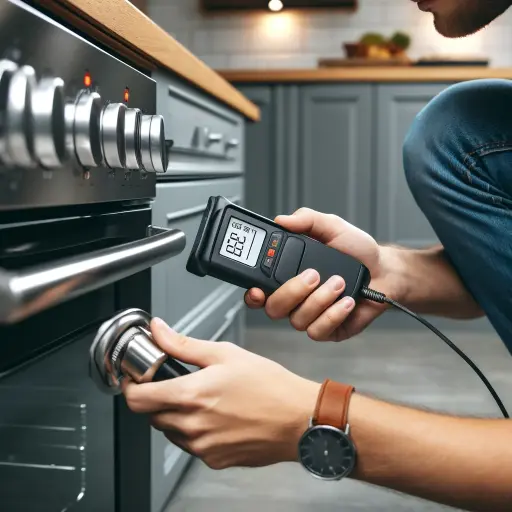
Here is the list of signs of gas leak:
- Unusual Smells: Natural gas is odorless, but gas companies add a distinctive, rotten egg-like smell to help detect leaks.
- Hissing Sounds: If you hear a hissing noise near your gas appliances or pipes, it could be a sign of a leak.
- Changes in Flame Characteristics: If the flame on your gas stove burns yellow instead of blue, or if it flickers excessively, it might indicate a gas leak.
- Physical Symptoms: Exposure to gas can cause symptoms like dizziness, nausea, headaches, and even difficulty breathing. If you experience any of these, it’s important to act quickly.
- Dead Plants: If your indoor plants suddenly start wilting or dying for no apparent reason, it could be due to a gas leak affecting oxygen levels.
- Visible Damage to Gas Lines: If you notice any visible wear and tear, like cracks, dents, or corrosion on your gas lines, it’s a cause for concern.
- Discolored Flames on Pilot Lights: If you have a gas appliance with a pilot light, and the flame is yellow or orange instead of blue, it’s a sign that something may be wrong.
- Bubbles in Soapy Water Test: A simple way to check for gas leaks is to mix water with a bit of dish soap and apply it to the gas line connections. If you see bubbles forming, it indicates a leak.
9 Safety Measures to Prevent Gas Stove Explosions
Ensuring the safety of your gas stove involves a combination of precautionary steps.
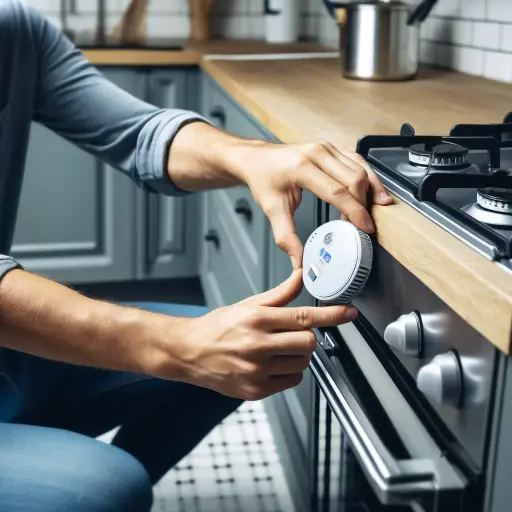
Here are nine vital measures to keep in mind:
- Proper Installation and Maintenance:
- Always hire certified professionals for gas stove installation. They have the expertise to ensure all connections are secure.
- Schedule regular inspections to catch any potential issues early.
- Gas Leak Detection and Response:
- Install gas detectors in your home. They can alert you to the presence of gas before it becomes dangerous.
- If you suspect a gas leak (due to smell, sound, or other signs), evacuate immediately and contact emergency services.
- Ventilation and Air Circulation: Ensure your kitchen is well-ventilated. Use an exhaust fan or open windows to allow fresh air in and vent out any gas buildup.
- Safe Practices while Cooking:
- Avoid wearing loose clothing while cooking. Loose sleeves or apron strings can accidentally catch fire.
- When not in use, use pot lids to cover pots and pans to contain heat and prevent gas buildup.
- Regularly Inspect Gas Lines and Connectors: Check for any visible signs of damage or wear on gas lines and connectors. Replace or repair them if needed.
- Use Gas Appliances as Intended: Follow the manufacturer’s instructions for the use and maintenance of your gas stove and other gas appliances.
- Educate Household Members: Ensure everyone in your household is aware of gas safety measures, including how to shut off the gas supply in case of an emergency. To find an ultimate guide on stoves, you can visit our website.
- Keep Flammable Items Away: Store flammable items like paper towels, dishcloths, or curtains away from the stove to prevent accidental fires.
- Emergency Response Plan: Establish a clear plan for what to do in case of a gas leak or stove-related emergency. This should include evacuation procedures and contacting emergency services.
- Remove Melted Plastic: Always remove melted plastic from your gas stove.
Can Leaving a Gas Stove On Cause an Explosion?
A. Risks of Leaving a Gas Stove Unattended
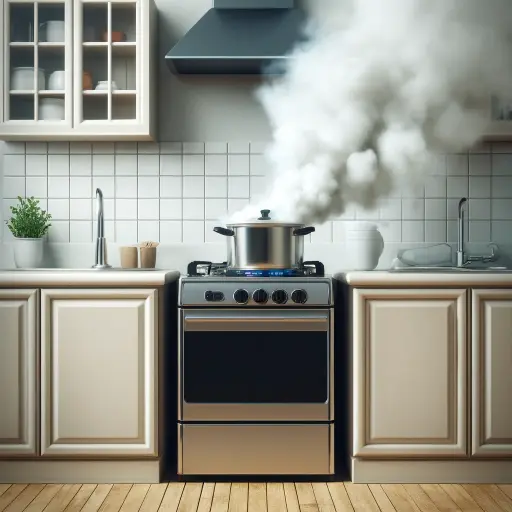
Leaving a gas stove unattended can lead to serious dangers:
- Gas Accumulation: If a burner is left on without ignition, gas can build up in the surrounding area. This increases the risk of a potentially hazardous situation.
- Open Flames or Sparks: Any nearby ignition source, like a lit match, candle, or electrical spark, can set off a dangerous explosion.
B. Potential Consequences
The consequences of leaving a gas stove on can be severe:
- Explosion Risk: If the accumulated gas comes into contact with an ignition source, it can lead to a powerful explosion.
- Fire Hazard: Even without an explosion, the presence of gas in the air increases the risk of a fire breaking out.
What to Do When Your Gas Stove Explodes
A. Immediate Actions
In the event of a gas stove explosion, take swift action:
- Turn Off the Gas: If it’s safe to do so, turn off the gas supply at the source to prevent further fueling the fire or explosion.
- Evacuate Immediately: Leave the premises swiftly and avoid inhaling any fumes or gases.
B. Evacuation Procedures
Follow these steps for a safe evacuation:
- Stay Low: If there’s smoke, stay close to the ground where the air is clearer.
- Use the Nearest Exit: Exit the building through the closest and safest route.
C. Contacting Emergency Services
Dial emergency services right away:

- Call 911: Inform them of the situation and provide your location.
- Do Not Re-enter the Building: Wait for professional help to arrive.
D. Professional Inspection and Repairs
After the incident, it’s crucial to:
Wait for Professionals: Only qualified technicians should assess the damage and make any necessary repairs.
How Big is a Gas Stove Explosion?
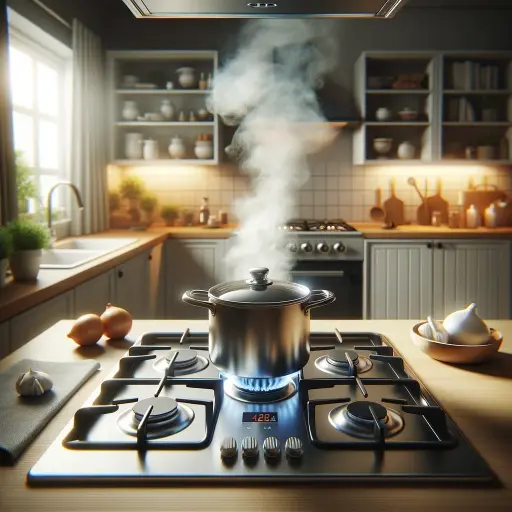
A. Scale of Damage and Impact
The extent of damage can range from minor to catastrophic:
- Minor Explosions: These may cause limited damage to the stove itself or nearby objects.
- Severe Explosions: In rare cases, a powerful explosion can result in significant structural damage.
B. Factors Influencing Explosion Magnitude
Several factors contribute:
- Gas Buildup: The amount of gas that accumulates before ignition plays a crucial role.
- Ventilation: Poor ventilation can lead to more concentrated gas pockets, potentially causing a larger explosion.
Legal and Liability Aspects
A. Responsibilities of Homeowners
Homeowners have a duty to ensure the safety of their property:
- Regular Maintenance: It’s the homeowner’s responsibility to conduct routine checks and maintenance of gas appliances, including the stove, to prevent potential hazards.
- Prompt Repairs: Any identified issues must be addressed promptly to avoid risks to occupants and visitors.
B. Landlord-Tenant Agreements
Clear agreements help allocate responsibilities:
- Lease Clauses: Rental agreements should specify who is responsible for gas appliance maintenance and safety, whether it’s the landlord or the tenant.
- Legal Compliance: Landlords must ensure that all gas appliances meet legal safety standards before renting out a property.
C. Liability of Manufacturers and Installers
Manufacturers and installers also play a crucial role:
- Product Liability: Manufacturers must produce stoves that meet safety standards, and they may be held liable if a defect leads to an explosion.
- Installation Standards: Installers must follow industry best practices to ensure safe operation. If an improperly installed stove causes harm, they may be held accountable.
Real-life Incidents and Case Studies
A. Notable Gas Stove Explosions
Learning from history helps prevent future incidents:
Historical Events: Examining specific incidents sheds light on the circumstances leading to gas stove explosions and the resulting consequences.
B. Lessons Learned from Past Accidents
Analyzing past accidents is a crucial step toward prevention:
Understanding what went wrong in previous incidents allows for the implementation of preventive measures to avoid similar situations in the future.
By understanding the legal responsibilities and learning from real-life incidents, homeowners, tenants, manufacturers, and installers can collectively contribute to the safer use of gas stoves and prevent potential dangers.
FAQs: Gas Stove Explosions
How often should I have my gas stove inspected?
Regular inspections are crucial for gas stove safety. It’s recommended to have a professional technician check your gas stove at least once a year to ensure all components are working correctly and to detect any potential issues early. To avoid any untoward incident, you should know common gas stove issues.
What should I do if I suspect a gas leak?
If you suspect a gas leak, it’s important to act quickly. Leave the area immediately and avoid using any electrical devices or open flames. Do not try to locate the source of the leak yourself. Once you’re in a safe location, call your gas company or emergency services for assistance.
3. Can I install a gas stove by myself?
It’s strongly advised against installing a gas stove on your own. Gas appliances require precise installation to ensure safety. Certified professionals have the expertise and knowledge to set up the stove correctly, including making sure all connections are secure.
How long does it take for a gas stove to explode?
A gas stove can potentially explode if there is a significant gas leak and an ignition source is present. However, the exact time it takes for such an event to occur can vary widely depending on several factors, including the size of the leak, the concentration of gas in the air, and the proximity of an ignition source. It’s important to note that gas stove explosions are rare and can often be prevented with proper maintenance and safety measures.
What should I do if my gas stove explodes?
In the event of a gas stove explosion, safety is paramount. Immediately turn off the gas supply if it’s safe to do so, evacuate the area, and contact emergency services. Do not re-enter the building until it has been declared safe by professionals.
How can I tell if my gas stove is functioning properly?
Look for signs like blue flames (indicating correct combustion), no unusual smells, and no strange sounds (like hissing); look for gas stove smoking. Additionally, if you notice any physical damage to the stove or gas lines, it’s essential to have it inspected by a professional technician. Regular, even flame patterns on all burners are also a good sign of proper operation.
Conclusion
In our journey through understanding gas stove safety, we’ve discovered the importance of being vigilant and cautious. While gas stoves make our kitchens vibrant hubs of delicious creations, they also carry potential risks. Gas stove explosions, though rare, can have serious consequences.
By learning about the causes, signs of danger, and safety measures, we can significantly reduce the chances of accidents. Regular maintenance, proper installation, and quick response to any unusual signs are key.
Remember, if you suspect a gas leak or an explosion, safety comes first. Evacuate immediately, and call for help.
Sources
- Research on the Causes of Gas Explosion Accidents Based on Safety Information Transmission.
- Cooking Gas Explosions As Cause Of Burns Among Patients Admitted To A Regional Burn Centre In Nigeria.
- Research on explosion characteristics and consequences of compressor room in compressor station of long-distance natural gas pipeline.
- Cause Analysis of the Large-Scale LPG Explosion Accident Based on Key Investigation Technology: A Case Study.
- Prevent Gas Accidents – Case Analysis.

